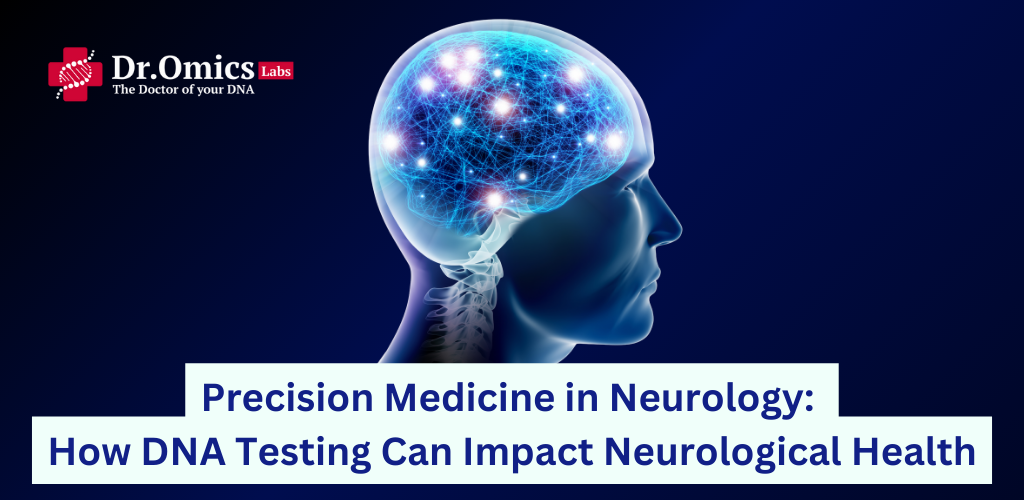The field of neurology is undergoing a transformative shift, fueled by groundbreaking advances in genetic research and the emergence of precision medicine. Neurological disorders, known for their complexity and multifactorial nature, have traditionally posed significant challenges in terms of accurate diagnosis and effective treatment. Conditions like epilepsy, Alzheimer’s disease, Parkinson’s disease, and multiple sclerosis often present with overlapping symptoms, making it difficult for clinicians to pinpoint the exact cause and tailor the right therapeutic approach.
However, the integration of precision medicine in neurology is revolutionizing neurological healthcare by leveraging DNA testing for neurological health. This innovative approach provides a deeper understanding of the genetic underpinnings that drive these disorders, enabling more accurate diagnoses and personalized treatment plans. By identifying specific genetic variations that influence disease risk, progression, and treatment response, precision medicine empowers neurologists to craft interventions that are tailored to each patient’s unique genetic profile, ultimately improving outcomes and enhancing quality of life.
Understanding the Role of Precision Medicine in Neurology
Precision medicine is a tailored approach to healthcare that takes into account an individual’s genetic makeup, lifestyle, and environment to devise customized treatment strategies. In neurology, this approach has shown promise in diagnosing, managing, and even preventing neurological disorders by identifying genetic variants that contribute to disease risk and progression. By utilizing DNA testing, neurologists can now pinpoint the genetic factors that influence a patient’s susceptibility to conditions such as epilepsy, Alzheimer’s disease, Parkinson’s disease, multiple sclerosis, and neurodevelopmental disorders.
The Impact of Genetic Testing on Neurological Health
Genetic testing has become a vital tool in precision neurology, providing insights that were previously unattainable through conventional diagnostic methods. Here are some key ways in which DNA testing for neurological health is making a significant impact:
- Accurate Diagnosis of Neurological Disorders:
- Many neurological conditions present with overlapping symptoms, making diagnosis challenging. Genetic testing can reveal specific mutations or genetic markers associated with particular disorders, leading to a more accurate diagnosis.
- For instance, identifying mutations in the SCN1A gene can confirm a diagnosis of Dravet syndrome, a severe form of epilepsy that requires specialized management.(1)
- Personalized Treatment Plans:
- Precision medicine allows for the customization of treatment based on genetic insights. By understanding a patient’s genetic profile, clinicians can choose medications that are more likely to be effective and have fewer side effects.
- In patients with Parkinson’s disease, variations in the LRRK2 gene can influence response to certain drugs, guiding neurologists in selecting the most suitable therapeutic approach.(2)
- Predicting Disease Risk and Progression:
- Genetic testing can identify individuals at high risk for developing neurological diseases, enabling early intervention and preventive measures.
- For example, the presence of the APOE ε4 allele significantly increases the risk of developing Alzheimer’s disease. Knowing this genetic risk can lead to proactive lifestyle modifications and monitoring to delay disease onset.(3)
- Guiding Surgical and Therapeutic Decisions:
- For epilepsy patients who do not respond to medication, genetic testing can help identify candidates for surgical intervention. Mutations in genes like DEPDC5 have been associated with drug-resistant epilepsy, prompting consideration for surgery as a viable treatment option.(4)
Key Genes and Their Influence on Neurological Disorders
The application of genetic testing in neurology involves analyzing specific genes known to impact neurological health. Here are four crucial genes that play a significant role in neurological conditions:
- HTT (Huntingtin Gene):
- Mutations in the HTT gene are responsible for Huntington’s disease, a neurodegenerative disorder characterized by motor dysfunction, cognitive decline, and psychiatric symptoms. DNA testing for expansions of CAG repeats in this gene can confirm a diagnosis, enabling early planning and family counseling.
- CACNA1A (Calcium Voltage-Gated Channel Subunit Alpha1 A):
- Variants in the CACNA1A gene have been linked to several neurological disorders, such as familial hemiplegic migraine, episodic ataxia, and spinocerebellar ataxia. Understanding these genetic mutations allows for targeted treatment strategies that can alleviate symptoms and improve patient quality of life.(6)
Benefits of Precision Medicine in Neurological Care
The adoption of precision medicine in neurology offers a multitude of benefits that extend beyond traditional approaches:
Early Detection and Prevention
Genetic screening offers the potential to identify predispositions to neurological disorders well before clinical symptoms manifest. For instance, individuals with genetic markers linked to Alzheimer’s disease or Parkinson’s disease can be monitored more closely, allowing for proactive lifestyle adjustments and early interventions that may delay the onset of these conditions. By understanding one’s genetic risks, preventive measures such as targeted therapies, dietary modifications, and cognitive exercises can be implemented earlier, potentially slowing disease progression and enhancing long-term neurological health.
Minimized Adverse Drug Reactions
Neurological patients often require complex, long-term medication regimens, which can lead to variable responses and adverse side effects. Genetic testing provides insights into how an individual’s body metabolizes specific drugs by examining variants in genes such as CYP2D6 and CYP2C19, which are critical for drug metabolism. This information enables clinicians to predict drug efficacy and safety, thereby optimizing dosages and avoiding medications that may cause harmful reactions. As a result, patients receive treatments that are not only safer but also more effective, reducing the risk of complications and enhancing their quality of life.
Cost-Effective Care
Precision medicine offers a more efficient and personalized approach to treating neurological conditions, ultimately leading to cost savings in healthcare. By tailoring therapies based on a patient’s genetic profile, the traditional trial-and-error method of prescribing medications can be minimized, reducing both time and resources spent on ineffective treatments. This approach not only shortens recovery times but also decreases the likelihood of hospital readmissions and adverse events, contributing to lower overall healthcare costs. By investing in genetic testing upfront, patients and healthcare systems can benefit from long-term cost efficiencies and improved patient outcomes.
Real-World Applications of
DNA Testing in Neurology
The application of precision medicine in neurology is already showing promising results in clinical practice:
- Epilepsy Management:
- Genetic testing has revolutionized the management of epilepsy, particularly in drug-resistant cases. For example, identifying mutations in the KCNQ2 gene associated with neonatal epilepsy can inform the use of specific anticonvulsants that target these channels.(7)
- Multiple Sclerosis (MS) Treatment:
- Precision medicine is making strides in the management of multiple sclerosis by identifying genetic markers that predict response to immunomodulatory therapies. This approach helps optimize treatment plans, potentially reducing relapse rates.
- Personalized Approaches in Autism Spectrum Disorders (ASD):
- Understanding genetic contributors to ASD, such as mutations in the SHANK3 or MECP2 genes, can guide tailored therapeutic strategies that address core symptoms, thereby enhancing developmental outcomes.(8)(9)
Conclusion
The integration of precision medicine in neurology represents a paradigm shift in diagnosing and treating neurological conditions. By leveraging the insights provided by DNA testing, neurologists can now go beyond traditional, symptom-based approaches to offer personalized care that targets the root cause of diseases. This precision-driven strategy enables clinicians to identify genetic mutations and variations that contribute to neurological disorders, allowing for more accurate diagnoses, customized treatment plans, and early interventions that can significantly improve patient outcomes. The ability to tailor therapies based on an individual’s genetic profile ensures that treatments are not only more effective but also carry fewer side effects, thereby enhancing the overall quality of neurological care.
Reference:
(1)https://pmc.ncbi.nlm.nih.gov/articles/PMC8739186/
(2)https://www.frontiersin.org/journals/neurology/articles/10.3389/fneur.2022.971252/full
(3)https://pmc.ncbi.nlm.nih.gov/articles/PMC5839141/
(4)https://www.nature.com/articles/s41598-017-12574-2
(5)https://www.nature.com/scitable/topicpage/huntington-s-disease-the-discovery-of-the-851/
(6)https://medlineplus.gov/genetics/gene/cacna1a/
(7)https://www.frontiersin.org/journals/pediatrics/articles/10.3389/fped.2014.00136/full




